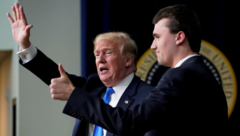Is America's Politics Behind the Rise of Campus Violence?

Published: 2025-09-11 03:28:03 | Category: wales
On a seemingly ordinary day at a Utah college, the atmosphere shifted dramatically when conservative activist Charlie Kirk was fatally shot while addressing a crowd. The incident has sparked discussions about political violence in America, particularly against a backdrop of increasing tensions and divisive rhetoric. Kirk, a prominent figure in conservative politics, is now viewed as a martyr by his supporters, raising questions about the implications of such violence on the political landscape.
Last updated: 04 October 2023 (BST)
Key Takeaways
- Charlie Kirk, a conservative activist, was shot during a public event at a Utah college.
- The shooting has intensified discussions about political violence and safety at public appearances.
- Many see Kirk's death as a martyrdom, which may further polarise political opinions.
- Prominent figures across the political spectrum have condemned the violence and called for a reduction in divisive rhetoric.
- Governor Spencer Cox highlighted the need for reflection on America's political state amid this tragedy.
The Events Leading Up to the Shooting
On that fateful day, thousands of students gathered under clear blue skies at a picturesque Utah college to hear Charlie Kirk speak. Known for his provocative conservative views, Kirk had built a reputation as a rock star in conservative campus politics. His organisation, Turning Point USA, had recently played a pivotal role in mobilising conservative voters during the last presidential election.
As Kirk debated political opponents, the atmosphere was charged with both enthusiasm and protest. However, moments later, a gunshot rang out, shattering the peaceful gathering. Kirk was struck in the neck, and chaos ensued as attendees fled in terror. The shocking images captured on camera will remain etched in the minds of those present, especially Kirk's young supporters.
The Impact of Kirk's Death
Charlie Kirk's untimely death is not just a personal tragedy; it represents a significant moment in the ongoing narrative of political violence in the United States. For many young conservatives, Kirk was a symbol of their beliefs and a rallying point for their cause. His assassination may galvanise his supporters, who might view him as a martyr, potentially intensifying the already polarised political discourse in America.
Kirk had often warned of threats from his critics, underscoring the contentious nature of contemporary political debate. His assassination raises questions about the safety of public figures, especially those who hold polarising viewpoints. This incident may prompt conservative activists to reconsider their security measures at public events, mirroring actions taken by other politicians following violent incidents.
Recent Trends in Political Violence
The shooting of Charlie Kirk is not an isolated incident; it fits within a troubling pattern of political violence that has become increasingly prevalent in the United States. Earlier this year, two Democratic state legislators in Minnesota were shot in their homes, resulting in one fatality. Such events highlight the dangers faced by public officials and the growing risk of violence in political discourse.
Similarly, former President Donald Trump has been the target of assassination attempts, reflecting a wider trend of hostility towards politicians across the spectrum. In 2021, a hammer-wielding assailant broke into the home of then-House Speaker Nancy Pelosi, further illustrating the dangers faced by political figures.
The Role of Rhetoric in Political Violence
Increasingly divisive rhetoric, amplified by social media and echo chambers, contributes to a toxic political environment. The language used by public figures can incite anger and violence, making it essential for leaders to temper their words and promote civil discourse. Following the shooting, Trump referred to the "radical left" as culpable for Kirk's murder, a statement that could further inflame tensions.
Calls for accountability and action against perceived threats have emerged across the political landscape. Conservative activist Christopher Rufo urged for a crackdown on left-wing groups, suggesting a more aggressive approach to dealing with political dissent. Such sentiments may resonate with those on the right seeking to protect their own, but they also risk exacerbating divisions and escalating violence.
Reactions from Political Leaders
In the wake of Kirk's death, political leaders from both sides of the aisle have condemned the violence. Many have called for a reassessment of the political climate and the language used in public discourse. However, the immediate response in Congress saw a moment of silence for Kirk quickly devolve into a shouting match, highlighting the ongoing partisan tensions that continue to plague American politics.
Governor Spencer Cox spoke passionately about the need for unity and reflection, questioning the state of a nation approaching its 250th anniversary. His remarks underscore the urgency of addressing the factors contributing to political violence in America, emphasising that the nation cannot afford to remain divided.
What Happens Next?
The aftermath of Charlie Kirk's shooting will likely have lasting implications for American politics. As leaders call for cooler rhetoric, the reality is that the political landscape has become increasingly hostile. The trajectory suggests that without significant changes in how political discourse is approached, further violence could occur.
The potential for a backlash against perceived threats to conservative values may lead to heightened security measures at public events, as activists and politicians alike seek to safeguard themselves. This could further change the nature of political engagement in America, making open dialogue more challenging.
The Bigger Picture
Understanding the implications of Charlie Kirk's death requires examining the broader context of political violence in the United States. The growing frequency of such incidents raises questions about the stability of democratic discourse and the safety of those engaged in public life. The intersection of social media, polarising rhetoric, and easy access to firearms creates a perfect storm for violence, necessitating a collective effort to address these issues.
The question remains whether America can overcome this cycle of violence and division. As leaders and citizens alike reflect on the current state of politics, it is crucial to foster an environment that encourages respectful debate and understanding, rather than hostility and fear.
FAQs
What happened to Charlie Kirk?
Charlie Kirk was shot in the neck during a public event at a Utah college, leading to his death. The incident has sparked discussions about political violence in America.
What is the significance of Kirk's death?
Kirk's death is seen as a martyrdom by his supporters, raising concerns about the implications of political violence and security for public figures in America.
How has political violence been trending in the US?
Political violence has increased in the US, with several recent incidents involving public officials, including shootings and assassination attempts, highlighting a concerning trend.
What are leaders saying about the incident?
Political leaders from both parties have condemned the violence and called for a reassessment of political rhetoric, although partisan tensions remain high in Congress.
What can be done to prevent political violence?
To prevent political violence, it is essential to promote civil discourse, temper divisive rhetoric, and address the underlying issues contributing to hostility in politics.
As America grapples with the implications of political violence, it is essential to consider how to foster a more respectful and civil political landscape. The future of American democracy may depend on it. #PoliticalViolence #CharlieKirk #CivilityInPolitics


